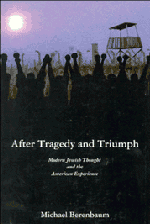Book contents
- Frontmatter
- Contents
- Foreword
- Introduction
- PART I THE HOLOCAUST IN CONTEMPORARY AMERICAN CULTURE
- 1 The Nativization of the Holocaust
- 2 The Uniqueness and Universality of the Holocaust
- 3 Public Commemoration of the Holocaust
- 4 Is the Centrality of the Holocaust Overemphasized? Two Dialogues
- 5 Issues in Teaching the Holocaust
- 6 What We Should Teach Our Children
- 7 The Shadows of the Holocaust
- PART II JEWISH THOUGHT AND MODERN HISTORY
- Notes
- Index
1 - The Nativization of the Holocaust
Published online by Cambridge University Press: 06 January 2010
- Frontmatter
- Contents
- Foreword
- Introduction
- PART I THE HOLOCAUST IN CONTEMPORARY AMERICAN CULTURE
- 1 The Nativization of the Holocaust
- 2 The Uniqueness and Universality of the Holocaust
- 3 Public Commemoration of the Holocaust
- 4 Is the Centrality of the Holocaust Overemphasized? Two Dialogues
- 5 Issues in Teaching the Holocaust
- 6 What We Should Teach Our Children
- 7 The Shadows of the Holocaust
- PART II JEWISH THOUGHT AND MODERN HISTORY
- Notes
- Index
Summary
American Jews and Israelis are both traumatized by the Holocaust, yet in confronting the same event, these communities draw different conclusions. Similar memories have been recounted to teach diverse lessons. If Israelis turn to the Holocaust as proof that the whole world is against them, American Jews reinforce their commitment to pluralism by recalling the atrocities that sprang from intolerance.
The following essay explores the “nativization” of the Holocaust in two countries and the consequent clash between the stories retold on American soil and those that predominate in Israel. In this chapter I examine the legitimate and inappropriate ways in which past recollections are used to justify the present and construct a future.
The Holocaust has become a symbol central to the identity of American Jewry. Public occasions with Jewish content are incomplete without a required reference to the Holocaust, the memory of which is evoked to rally philanthropists and political activists, to challenge complacency, to undermine or fortify the Jewish establishment, to measure impending danger or bolster solidarity. The authority of the Holocaust is invoked as compelling proof for the veracity of a position. Charges that an opponent's view might encourage the repetition of genocide, or grant Hitler a posthumous victory, are the ultimate epithets. Within the American Jewish community, the Holocaust has entered the domain of shared sacredness.
Perhaps a growing consciousness of the Holocaust was inevitable as the memory of the actual event receded and as those with direct memories of the war – or of Jewish life in prewar Eastern Europe – perished in the fullness of years.
- Type
- Chapter
- Information
- After Tragedy and TriumphEssays in Modern Jewish Thought and the American Experience, pp. 3 - 16Publisher: Cambridge University PressPrint publication year: 1990
- 2
- Cited by

